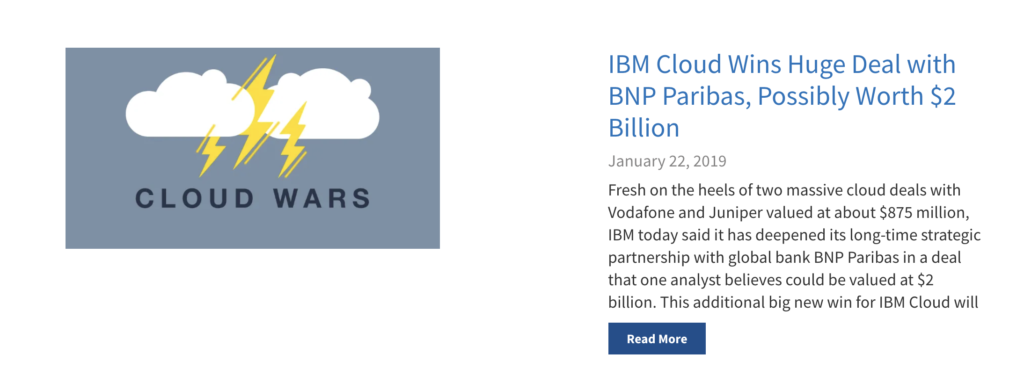Expressing optimism about the future prospects for IBM’s $19.5-billion cloud business, top global sales executive Martin Schroeter said at a recent investors conference that “every [customer] discussion is about cloud” and “everyone is thinking about it.”
And while those customers are aggressively exploring various ways to weave cloud technologies more deeply into their businesses, said Schroeter, who is senior vice president of global markets, IBM believes that hybrid cloud will be the big winner.
“Every discussion is about cloud, whether that’s ultimately going to be public, or whether that’s going to stay on-premises, or whether that means the private cloud,” Schroeter said during a Q&A presentation at the recent Bank of America Merrill Lynch Global Technology Conference.
“So the discussion is about hybrid because that’s the world in which we all live and are going to live—that’s the way the world’s going to stay,” he said.
‘The Cloud Is Here and Everyone’s Thinking about It’

“The cloud is here, it’s real, and everyone is thinking about it. But today the state of play for most of our clients is five or six clouds. So the idea that everything will move immediately to the public cloud is something we never thought was viable. We didn’t form that opinion on our own. We formed it by talking to our clients: all the banks, all the airlines, all the supply chains,” Schroeter said.
And Schroeter—who was IBM’s CFO before taking over not long ago as head of global sales—said the big part of the cloud market is still untapped and will involve mission-critical systems, data and processes, areas for which he feels IBM is uniquely qualified.
“The things that are going to be the next push will be mission-critical,” he said, noting that customers here in mid-2019 expect mission-critical apps and systems to be agile, flexible, and fully capable of ingesting data to improve speed and outcomes.
“Some things obviously are going to stay on-prem, and a lot of our clients are building private clouds because you get all the agility and there’s no additional economic cost, if you will, from going to public. Particularly if you’re in a regulated industry, private makes a lot of sense because you can navigate a regulated environment in a private cloud while also getting the agility you need,” Schroeter said.
Some other key topics addressed by Schroeter:
The Power of Trust in a Data-Driven Economy
Customers “trust us because they trust our technologies, they trust us because we introduce technologies in a very responsible way, and they trust us because we understand their industry.
“And they also trust us for another really important reason: they understand our business model and they know we’re not competing with them,” he said.
“So when you look at the long journeys they’re on, whether that’s moving to a hybrid cloud to get new AI capabilities or moving to a hybrid cloud to get better agility, our customers trust that we won’t end up competing with them. We can have very different discussions around their data because with us, they know they own it—and they know they own their insights.”
The Need for Open Technologies and Unrestrained Choices
Schroeter says he constantly hears similar themes from customers about the need for open environments to prevent vendor lock-in. “They say, ‘We can’t be working in a closed environment. I cannot build my enterprise and all the mission-critical apps in a closed environment where I’m locked into a single vendor. I can’t absorb all of these AI tools necessarily unless they’re open,’” he said in summarizing customer concerns.
How Red Hat Will Ensure Customers Have More Choices
“IBM and Red Hat together allow us to ensure we can give customers that open stack that allows them to be confident in those mission-critical apps as they start to move, and that they’re not going to get locked in or tied down and their enterprises will be safe,” Schroeter said of IBM’s acquisition of Red Hat. That acquisition is expected to be completed sometime later this year.
“From day one, we’ve said let’s make sure everyone recognizes that Red Hat is, in my words, the Switzerland of operating systems. And we’ll make sure they stay right there. The developer ecosystem they built is really powerful, and the commitment to open is really powerful. And we’ve promised we’re going to keep that exactly as it is.”
Disclosure: at the time of this writing, IBM was a client of Evans Strategic Communications LLC.
Subscribe to the Cloud Wars Newsletter for in-depth analysis of the major cloud vendors from the perspective of business customers. It’s free, it’s exclusive, and it’s great!









